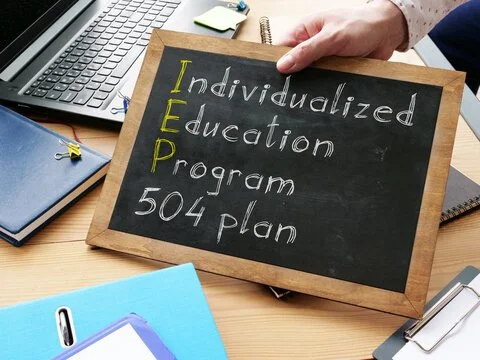IEP vs. 504 Plan: How Psychoeducational Evaluations Inform Educational Support
Navigating the world of special education can feel a bit like trying to crack a secret code. You’ve got acronyms flying at you—IEP, 504—and a whole lot of jargon that can leave even the savviest parent and teacher scratching their head. It’s no wonder many people do not have a clue where to start. But don’t worry! This blog will provide information on IEPs and 504 Plans.
We’ll also dive into how Psychoeducational Evaluations play a crucial role in deciding which plan—if any—is right for your child
What Are IEPs and 504 Plans Anyway?
An IEP is…
An IEP, also known as an Individualized Education Program, is a legal document under the Individuals with Disabilities Education Act (IDEA). It’s designed for students who require specialized instruction and related services (e.g., speech therapy, occupational therapy). An IEP includes specific goals and accommodations tailored to your child’s needs.
This plan is a comprehensive, customized strategy that implements a plan that helps your child’s educational needs. It's detailed and that spells out the specific special education services, accommodations, and modifications your child will receive.
IEPs are created for students who have an eligible disability that affects their ability to learn in school. This can include the following:
ADHD
Speech and language delays
Autism
And more
504 Plans are…
A 504 Plan is a civil rights plan under Section 504 of the Rehabilitation Act. It provides accommodations to ensure students with disabilities have equal access to education. Unlike an IEP, it does not include specialized instruction, focusing instead on removing barriers (e.g., extra time on tests, preferential seating).
These plans focus mainly on accommodations in the general education system. They were designed to help students access the same educational opportunities as other students by ‘leveling the playing field’. Here are several examples:
Extended test time
Permission to utilize assistive technology
Preferential seating
And more
Here’s a fun analogy to make it clearer: Imagine two kids with the same pair of shoes. One kid has perfectly fitting shoes but just needs some extra cushion (a 504 Plan). The other kid needs the shoes to be resized entirely (an IEP). Both get what they need, but the level of intervention differs.
How Psychoeducational Evaluations Fit In
Now that you know the differences between IEPs and 504 Plans, it is crucial to understand how you determine which one is best suited for your child. Psychoeducational evaluations to the rescue!
Psychoeducational evaluations assess your child’s learning profile and cognitive development. They additionally identify strengths, weaknesses, and potential issues regarding their academic success.
A psychoeducational evaluation typically assesses the following:
Cognitive abilities – How your child processes information and thinks
Academic performance – How well your child does in areas such as writing, reading, and arithmetic
Attention, memory, and executive functioning – Do your child struggle with focusing, staying organized, or with memory i.e. remembering verbal instructions?
Behavior and emotional processing and functioning – How well does your child handle social situations and interactions, stress, and their emotions?
Psychoeducational evals help determine where your child currently is regarding academic and personal success. These assessments help determine if they are eligible for an IEP, 504 Plan, or perhaps an alternative strategy. The final determination for eligibility is typically done in a multidisciplinary team meeting with the school and parent present.
IEP or 504 – Which is the Right Plan?
A Psycho-educational Evaluation plays a pivotal role in determining whether your child would benefit more from an IEP or a 504 Plan. Here's how:
Understanding the Severity of the Challenge
The evaluation can pinpoint the root cause and severity of your child’s difficulties. For example:If your child has dyslexia and is reading significantly below grade level, they may need specialized instruction included in an IEP.
If your child has ADHD and struggles with focus but performs at grade level, a 504 Plan with accommodations like extended time or movement breaks may be sufficient.
Determining Eligibility
An IEP requires that the student’s disability impacts their ability to learn and necessitates specialized instruction. The evaluation provides the data needed to meet these eligibility criteria.
For a 504 Plan, the evaluation demonstrates whether the child has a disability that substantially limits one or more major life activities, such as learning or concentration.
Matching Support to Needs
The detailed report from the evaluation helps educators and parents collaborate on a plan that aligns with the child’s strengths and weaknesses. For instance:A child with auditory processing difficulties might benefit from an IEP with speech therapy.
A child with mild anxiety might thrive with a 504 Plan offering a quiet test environment.
Setting Realistic Goals
If the evaluation identifies specific areas where your child is behind, an IEP can include measurable goals to address these deficits. On the other hand, a 504 Plan would focus on accommodations to help the child work around their challenges.
A Real-Life Example – When to Choose an IEP or 504 Plan
*name changed for confidentiality reasons
Emma is a 10-year-old student who has always struggled with reading comprehension and staying focused in class. Her parents noticed she was falling behind in school, so they decided to pursue a psycho-educational evaluation. Here’s what the evaluation revealed:
Cognitive Testing: Emma’s overall intelligence was in the average range, but she showed weaknesses in working memory and processing speed.
Academic Testing: Emma’s reading skills were two grade levels and was some of her test scores were below two standard deviations below her age-related peers.
Behavioral Assessments: Teachers reported that Emma had difficulty staying on task and often needed repeated instructions.
Based on these results, the school team determined that Emma qualified for an IEP. Her plan included:
Specialized reading instruction three times a week
Extra time on tests and assignments
Regular check-ins with the school counselor to address attention challenges
If Emma’s academic performance had been on grade level but she still struggled with focus, a 504 Plan with accommodations like extended time and seating near the teacher might have been the better choice.
Parents Role
You may be wondering what role you play during this whole process. Although this process may feel tiring, your child deserves the chance to thrive in their academic and personal worlds. You are not merely a bystander; you are their main support system!
You can participate as an active advocate for your child and their academic needs. You are part of the team that helps determine whether an IEP or 504 Plan is more appropriate. Do not hesitate to ask questions, offer suggestions, or request specific modifications, accommodations, or services as you know your child well.
Bottom Line
A psycho-educational evaluation is a powerful tool to ensure your child gets the right support in school. By providing a clear understanding of your child’s unique needs, it helps parents and educators make informed decisions about whether an IEP or a 504 Plan is the most appropriate path. If your child is struggling and you’re not sure where to start, consider scheduling a psycho-educational evaluation with a top mental health professional—it could make all the difference in unlocking their full potential.
Schedule a free consult today to find out the best type of psycho-educational evaluation to get for your child. Also, check out the blog on the Top 10 Signs Your Child Needs A Psycho-Educational Evaluation
The Mind Center, LLC is a thought leadership mental health brand dedicated to helping parents, their kids, and the schools they attend. At The Mind Center LLC, we specialize in psycho-educational evaluations and offer a range of services to support children. Contact us today.






